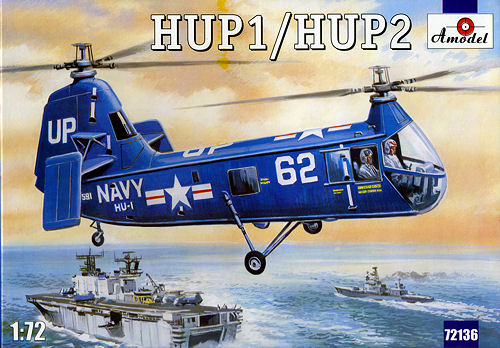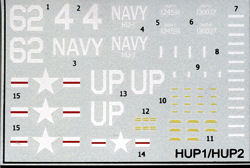Amodel 1/72 Piasecki HUP-1/2
|
KIT #: |
72136 |
|
PRICE: |
$22.95 SRP |
|
DECALS: |
Two options |
|
REVIEWER: |
Scott Van
Aken |
|
NOTES: |
Short run kit with injected parts
|

The
Piasecki H-25 Army Mule/HUP Retriever was a compact single radial
engine, twin overlapping tandem rotor utility helicopter developed by the
Piasecki Helicopter Corporation of Morton, Pennsylvania during the late 1940s
and produced during the early 1950s. The company changed its name in the 1956 to
Vertol Aircraft Corporation and subsequently was bought by Boeing Aircraft
Company in 1960, and became Boeing-Vertol.
The HUP was produced for the Navy in four versions: HUP-1, -2, and -3. The
HUP-2 was the first production helicopter equipped with an auto-pilot. The US
Navy also tested a system called 'Raydist that allowed an unmanned HUP-2
to be directed from a ground station and by radio ordered to hover with in 5
feet of the desired point. Edo tested a HUP-2 with a fiberglass hull and
outrigger floats for amphibious operations. In addition to those delivered to
the U.S. Navy and Army the HUP/H-25 helicopter was also delivered to the
Canadian and French Navies. A total of 339 aircraft were delivered over the
20-year life of the aircraft.
Molded
in Amodel's usual low pressure injected plastic, the surface detail is actually
quite good. Clear parts are fairly well molded, but a bit thick and not as clear
as you might find on some other kits.
The kit provides a rather complete cockpit with seats, control
consoles and a single cyclic. No collective is provided, but you can easily make
one. The continuous cabin has no internal detail, but does include a rear
bulkhead and a roof section. The kit also includes a complete radial engine with
engine mount and exhaust. Not sure how much if any of it will be visible when
the kit is complete, but there it is.
There are two identical sprues for the rotor heads and the blades.
The blades are supposed to fit into impossibly small indents in the head and I
would be quite surprised if these tiny recesses will be enough to hold the
blades in place.
The fuselage has a separate main door and it appears that perhaps
one could build the cockpit side windows open. The landing gear look
particularly spindly, but I have found the once cemented together, these
constructs are usually quite sturdy. Thanks to the HUP being a tail dragger, no
worries about where to ut nose weight. I found it interesting that there is a
maintenance stand permanently mounted on the starboard rotor sail. The only
external difference betwee n
the -1 and -2 is that the earlier version has a
horizontal stab and fin on each side. Choice is yours as HU-1
operated both at the same time.
n
the -1 and -2 is that the earlier version has a
horizontal stab and fin on each side. Choice is yours as HU-1
operated both at the same time.
Instructions are well drawn with generic and Humbrol paint
references. Markings are pretty much all white aside from the red insignia
stripes. You can do one of two aircraft. One is a -1 and the other a -2. Both
are from HU-1 and both are in overall gloss sea blue. While this color did turn
slightly matte over time at sea, it never really was more than semi gloss. The
decal sheet is well printed and should work without many issues. The markings
are rather matte, which I know some people like, but these were painted in gloss
white on the aircraft.
A nice choice of kits from Amodel. This
is also boxed as the Army version and I am sure others. It appears to be a
pretty straight-forward build, though I have found that no Amodel kit is as easy
as it looks. I had to chuckle at the box art showing 21st century naval vessels
and a 1950s helo!
http://en.wikipedia.org/wiki/Piasecki_HUP-1
December 2012
Thanks to me for ordering what has to be a less than simple
kit to build.
If you would like your product reviewed fairly and fairly quickly, please contact the editor or see other details in the
Note to
Contributors.
Back to the Main Page
Back to the Previews Index Page


 n
the -1 and -2 is that the earlier version has a
n
the -1 and -2 is that the earlier version has a